Many people want clear skin and are willing to do whatever it takes to get there.
This might include using a medication like Accutane, which can be very effective in treating acne.
However, some people are wondering if they can also use retinol while on Accutane to boost its effect.
But like everything else that has to do with the function of the skin, the answer to this isn’t as simple as a yes or no.
Therefore, this article will discuss some benefits, drawbacks, and precautions you need to take if you want to use retinol while on Accutane.

What is Retinol?
Retinol is a component that belongs to the family of retinoids, which are vitamin A derivatives.
Once applied to the skin, the active ingredient in retinol travels deeper through the epidermal layers and binds to specific receptors involved in the skin’s cellular regeneration process.
This action changes how the cells regenerate, promoting an increased cell turnover rate, which pushes new, healthy skin cells to the skin’s surface.
As healthy skin cells replace older, damaged cells, retinol users will notice visible improvement in the skin’s overall appearance.
Retinol is sold in over-the-counter products as it is suitable for most skin types and conditions.
However, it comes in various strengths.
Lower-strength retinol products (around 0.1% to 0.3%) are generally considered suitable for beginners or people with sensitive skin.
They provide many of the same benefits as higher-strength products but with less risk of side effects.
Higher-strength retinol products (0.5% to 1.0%) can provide more pronounced benefits but also have a higher risk of causing skin irritation.
They’re typically recommended for people who are acclimated to lower-strength retinol.
Retinol has many benefits for the skin, including:
- Boosting collagen production.
- Reducing the appearance of wrinkles and fine lines.
- Soothing acne.
- Fading hyperpigmentation.
- Improving the appearance of atrophic acne scars.
- Evening out the skin tone.
- Refining skin texture.
What is Accutane?
Accutane is the brand name for the medication known as isotretinoin, which is used to treat severe acne.
It is commonly prescribed to people whose acne has resisted previous treatments, such as benzoyl peroxide, adapalene, and antibiotics.
Accutane works by reducing sebum production in the skin and promoting apoptosis (programmed cell death) in sebocytes, the cells that produce sebum.
This leads to a significant decrease in oil production, helping clear up acne since excess oil is essentially food for the acne-causing bacteria that live on the skin.
Therefore, once the gland’s activity is obstructed, it will produce less oil, which will cause the bacteria to become starved, thus minimizing proliferation and eventually minimizing acne, too.
However, this process can also make the skin extremely dry and sensitive as sebum is the substance that keeps our skin moisturized, soft, and supple and creates a barrier between the skin and the external world.
Once reduced, the skin will become exposed to various environmental aggressors and pathogens that can trigger irritating reactions.
Additionally, without sebum preventing moisture from evaporating, the skin can quickly become dehydrated.
When the skin loses its natural moisture, it can cause a host of issues, such as dryness, flaking, and itching.
This state of dehydration can also lead to compromised skin barrier function.
Therefore, while Accutane is a very effective medication against acne, it’s known to come with some unpleasant side effects.
Some observed side effects of Accutane include:
- Dryness.
- Peeling.
- Itching.
- Redness.
- Increased sun sensitivity.
- Headaches.
- Muscle aches.
- In rare cases, mood swings have been reported in people who have been taking high-strength isotretinoin for an extended period.
What are the Side Effects of Using Retinol While on Accutane?
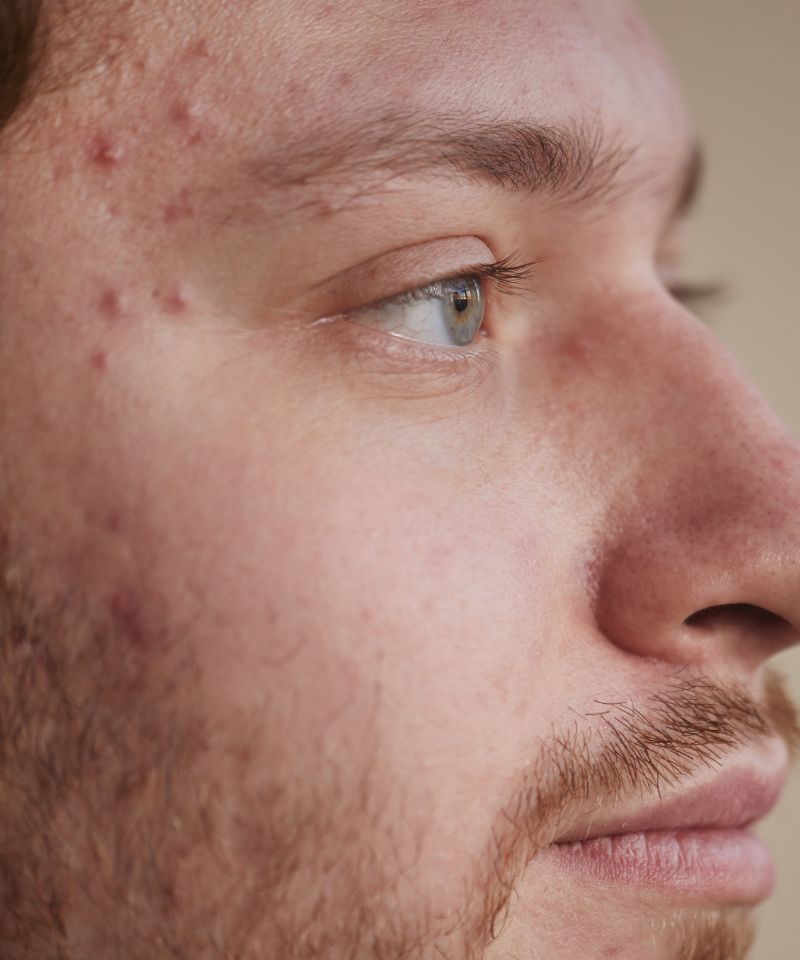
Accutane and retinol are vitamin A derivatives.
Therefore, when combining the two, you’re essentially doubling up on treatments that both reduce oil production and increase skin cell turnover but also significantly dry out and irritate the skin.
This can lead to several skin and health concerns:
Excessive Dryness and Irritation:
Both Accutane and retinol can dry out the skin. Using them together can intensify this dryness, leading to severe irritation, peeling, and discomfort.
Overstimulation of Skin Renewal:
While promoting skin cell turnover is beneficial to a certain extent, overdoing it can stress the skin.
The combined effect of Accutane and retinol can accelerate skin renewal excessively, potentially leading to inflammation, increased sensitivity, and a higher risk of scarring, especially in acne-prone or sensitive skin.
Compromised Skin Barrier:
The skin barrier is essential for protecting against environmental irritants and bacteria.
Both Accutane and retinol can weaken this barrier by reducing sebum production, and using them together can exacerbate this effect, making the skin more susceptible to infections and damage.
Compromised Healing:
The skin’s ability to heal and respond to damage can be compromised due to the combined effects of Accutane and retinol.
A compromised skin barrier will make the skin more susceptible to infections and can prolong the healing process of any skin injuries or irritations.
Increased Risk of Side Effects:
Since both treatments can cause similar side effects, using them together can increase the likelihood and severity of these effects, potentially leading to more serious skin and health issues.
Teratogenicity:
Since Accutane is a medication that promotes apoptosis (programmed cell death), it can cause birth defects, likely because it affects neural crest cells (which are important in early development.)
This is why Accutane is strictly contraindicated during pregnancy.
Some stronger topical retinoids, such as tretinoin, have also been linked to increased risks of birth defects when used in excess, and although retinol is considered less potent, it may still pose a risk when combined with Accutane.
Increased Risk of Toxicity:
Both Accutane and retinol are forms of vitamin A, and their combined use can increase the risk of vitamin A toxicity.
This can lead to a range of symptoms, including liver damage, bone and joint pain, and severe headaches.
Mucocutaneous Side-Effects:
These are skin and mucous membrane issues, like dry skin and lips, which might be due to effects on skin cells and mucosa cells.
Using Accutane and retinol together can increase the risk of these effects, making them more severe.
In conclusion, while both Accutane and retinol are effective acne treatments on their own, using them together can lead to increased risks and side effects.
It is recommended to use either one or the other rather than combining them for maximum effectiveness and safety.
5 Effective Alternatives to Retinol During Accutane Treatment
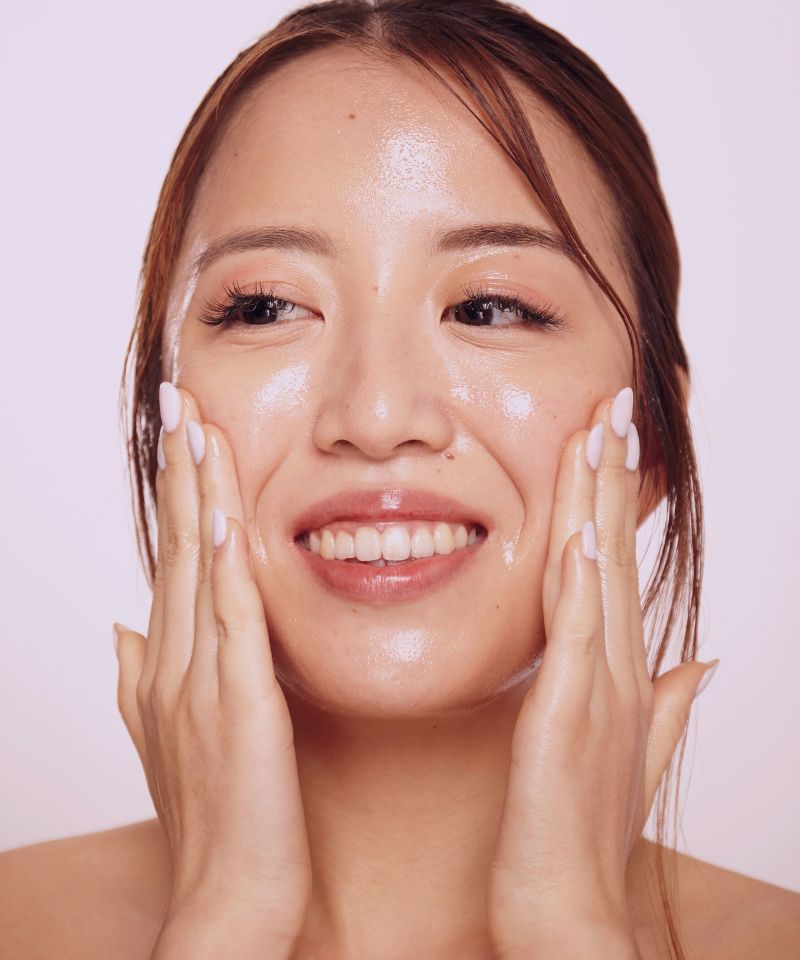
While using retinol during Accutane treatment may not be ideal, there are still effective alternatives available.
Here are some retinol alternatives you can use to improve your skin’s health and appearance while on Accutane:
Niacinamide
Niacinamide, also known as vitamin B3, is a multi-functional skincare superstar that plays a pivotal role in maintaining skin health.
It works by strengthening the skin’s barrier, enhancing its resilience, and boosting its ability to retain moisture—an essential for dry and damaged skin commonly seen in individuals undergoing Accutane treatment.
Furthermore, niacinamide is renowned for its anti-inflammatory properties, making it effective in neutralizing redness and reducing irritation.
So, while you’re on Accutane, niacinamide can be an excellent alternative to retinol, offering similar benefits without the heightened risk of side effects.
Azelaic Acid
Azelaic acid is a game-changer for those undergoing Accutane treatment.
This naturally occurring acid, found in grains like barley and wheat, can reduce the overgrowth of the acne-causing bacteria without irritating the skin, making it ideal for sensitive and inflamed skin on Accutane.
Additionally, azelaic acid also brightens the skin and reduces hyperpigmentation, which will help fade any acne scars left behind.
Without the harshness of retinol, azelaic acid serves as an effective and gentler alternative while you’re on Accutane, helping you manage your skin without the excessive risk of side effects.
However, since azelaic acid is available in over-the-counter and prescription-strength options, make sure to pick the former while on Accutane, as these are usually milder and gentler on the skin.
Prescription-strength azelaic acid of over 15% can cause initial dryness, redness, and irritation, which can exacerbate the side effects of Accutane.
Peptides
Peptides are short chains of amino acids that function as the building blocks of proteins like collagen, elastin, and keratin, which are essential for maintaining the skin’s texture, strength, and resilience.
They work by signaling the skin to produce more collagen, hence playing a crucial role in repairing skin damage and reducing signs of aging, such as fine lines and wrinkles.
In contrast to retinol, peptides are known for their gentle action, making them a fantastic alternative for those undergoing Accutane treatment who also want to target signs of aging.
They deliver similar anti-aging benefits without the potential for irritation, making them an ideal choice for sensitive and reactive skin.
Ceramides
Ceramides are naturally occurring lipids (fats) found in the uppermost layers of the skin.
They work by creating a protective barrier that locks in moisture and shields the skin against environmental aggressors, like pathogens, pollutants, and harsh weather conditions.
These hard-working molecules are essential in maintaining the skin’s structure, making it less reactive to irritating stimulants, including the overgrowth of acne-causing bacteria.
But ceramides can also have anti-aging benefits, as they improve the skin’s moisture retention, which fills up fine lines and wrinkles and makes the skin appear plump, hydrated, and supple.
So, if you’re on Accutane and need an alternative to retinol, ceramides could be your skin’s best friend.
Centella Asiatica
Centella Asiatica is a plant extract rich in amino acids and is widely recognized for its potent anti-inflammatory and antioxidant properties.
This skincare gem works by soothing the skin, reducing redness and irritation, and boosting the skin’s healing process, making it particularly beneficial for those on Accutane treatment experiencing dryness, flakiness, and sensitivity.
Furthermore, its antioxidant properties add an additional layer of protection against environmental damage, enhancing the skin’s resilience over time.
So, if you’re looking for an effective retinol alternative during your Accutane journey, Centella Asiatica could be a great option to explore.
The Best Retinols for After Accutane
Here are my five top choices of retinols you can use after Accutane:
LilyAna Naturals – Retinol Cream – $20
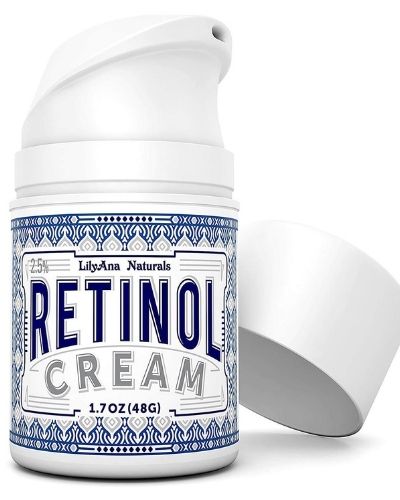
With over 32,000 reviews on Amazon, LilyAna’s Retinol Cream is a product that delivers.
The moisturizing formula features hydrating, soothing, and antioxidant ingredients such as aloe, hyaluronic acid, vitamin E, green tea extract, nourishing shea butter, and softening jojoba oil to nurture the skin and prevent it from becoming dry.
On the other hand, pure retinol helps combat visible signs of aging, including fine lines and wrinkles, and takes care of uneven skin tone and rough texture while improving the loss of firmness.
CeraVe – Resurfacing Retinol Serum – $17
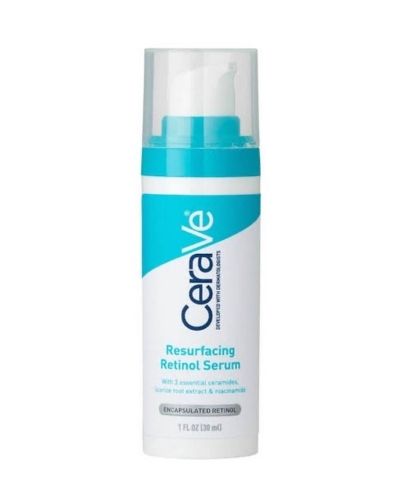
The Resurfacing Retinol Serum by CeraVe is the best affordable retinol on the market that helps get rid of post-acne scarring such as red and dark spots, due to containing barrier-repairing niacinamide and skin-soothing propanediol.
It’s mild, gentle, and unlikely to cause irritation, making it perfect for those who are looking for a decent, budget-friendly retinol post-Accutane.
CeraVe – Skin Renewing Retinol Serum – $19
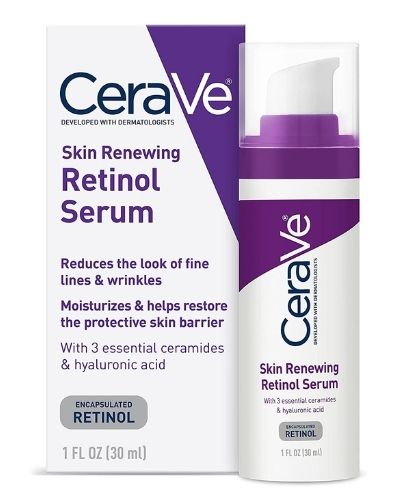
CeraVe’s Skin Renewing Retinol Serum is suitable for dry, sensitive, and even eczema-prone skin.
It’s a gentle yet effective daily retinol serum that provides a variety of brightening and anti-aging benefits thanks to the blend of barrier-strengthening ceramides, soothing and brightening niacinamide, and hydrating hyaluronic acid.
Neutrogena – Rapid Wrinkle Repair – $24
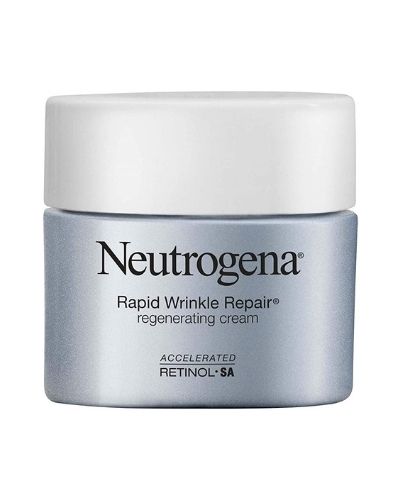
Neutrogena’s Rapid Wrinkle Repair is another bestseller from Amazon that boasts over 37,000 reviews.
The moisturizing formula contains hydrating hyaluronic acid alongside triglycerides that soften and nourish the skin.
Retinol helps reduce the appearance of pronounced fine lines and wrinkles and fades stubborn hyperpigmentation and discoloration.
Affordable and efficient, Neutrogena’s Rapid Wrinkle Repair may be worth trying, especially if you need an anti-aging boost while taking Accutane.
First Aid Beauty – FAB Skin Lab Retinol Serum 0.25 Pure Concentrate – $58
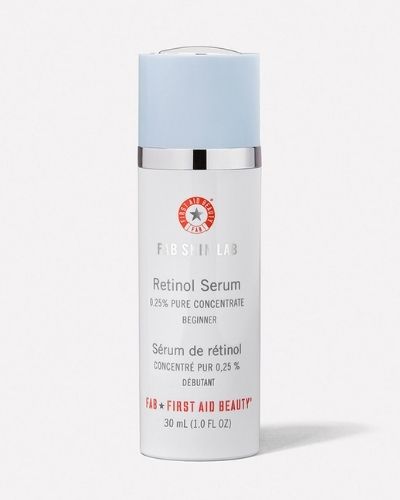
First Aid Beauty’s Retinol Serum is the perfect beginner option that also layers well after a hydrating toner and before a moisturizer.
The concentrate contains 0.25% retinol, the perfect beginner-friendly strength that helps smooth the skin and minimize the appearance of fine lines and wrinkles, alongside a skin saver complex, a signature blend of hydrating hyaluronic acid, soothing colloidal oatmeal, moisturizing allantoin, calming aloe, barrier-strengthening ceramides, and antioxidants such as vitamin C and E that help protect and boost skin’s health.
Frequently Asked Questions
Here are some frequently asked questions about Accutane and retinol:
How Long After Accutane Can You Use Retinol?
Typically, you should wait 3-6 months after completing your Accutane treatment before introducing retinol into your skincare routine.
This waiting period ensures that your skin has fully recovered from the strong medication and is ready to handle the potency of retinol.
Is Accutane and Retinol the Same?
The difference between the two is that Accutane is an oral medication used for severe acne, and retinol is a topical product that encourages cellular turnover and collagen production.
While both Accutane and retinol are vitamin A derivatives, they are not the same.
Can I Take Antibiotics While on Isotretinoin (Accutane)?
Some antibiotics, such as tetracycline, Doxycycline and Minocycline can interact with isotretinoin and lead to severe side effects, which is why they’re not recommended to be taken alongside Accutane.
While most antibiotics are safe to take with Accutane, it’s crucial to consult with your doctor before taking any medication while on Accutane.
READ NEXT:

My name is Simone and I am a certified skin specialist. I created this website to teach my readers how to take great care of their skin and I also like to occasionally share my honest opinions on skincare products I’ve tried. You can learn more about me here.
